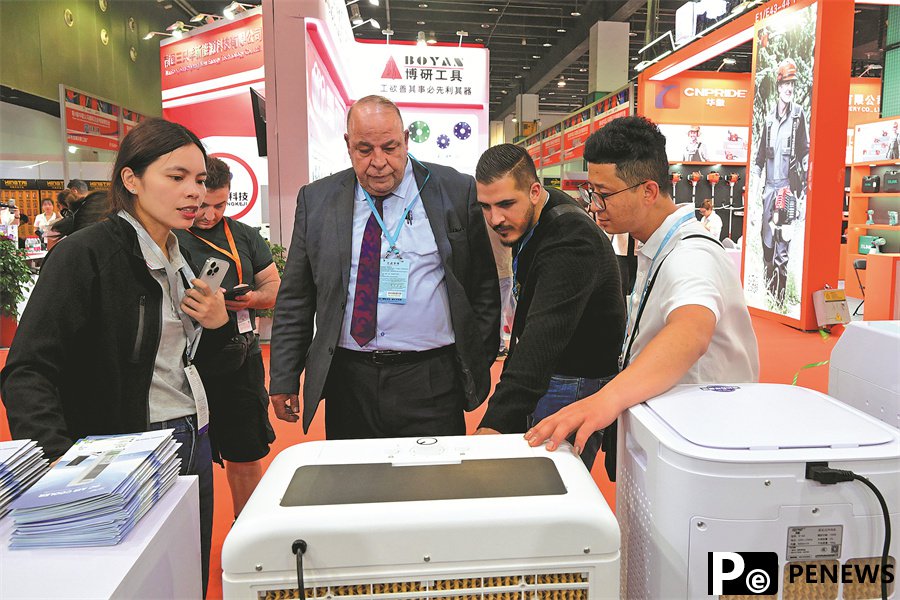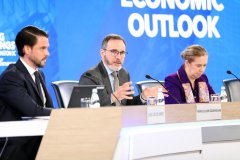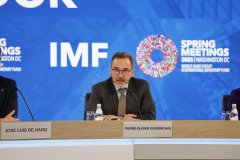Home>>
World's biggest small-commodities market unfazed by US tariffsBy CHEN YE in Yiwu, Zhejiang (China Daily) 08:32, April 23, 2025

A merchant demonstrates a toy camera to a Spanish trader at Yiwu International Trade Market in Jinhua, Zhejiang province, on April 15.[SHI BUFA/FOR CHINA DAILY]
While the United States' unwarranted imposition of tariffs has strained the nerves of traders around the globe, merchants in Yiwu, Zhejiang province, are confident their exploration of diversified export markets over the years will shield them from any heavy impact.
Known for its "small profits, quick turnover" model, Yiwu International Trade Market is renowned as the world capital of small commodities. The market consists of five districts housing 75,000 stores, with over 3,000 of those exporting merchandise to the US.
Yiwu Yexin Electronics began operating in the market in 2010 and currently has four stores across the districts. Company sales manager Mao Yeqiang said like many operators in the market, they follow a "store in the front, factory in the back" model and mainly export wearable products such as headphones and smartwatches to Europe, Southeast Asia and South America.
This year, Southeast Asia will account for 60 percent of their exports, and Europe about 30 percent. "US orders were normal last year, but this year they've nearly vanished, dropping from 10 percent to far less," Mao said.

A merchant negotiates prices for insulated bags with Ethiopian traders at the market on April 15.[SHI BUFA/FOR CHINA DAILY]
Although they had plenty of orders early this year, April has been noticeably quieter compared with previous years. A direct impact of the tariff war has been the sharp decrease in order volumes, he said. Bulk orders of thousands, or tens of thousands, of units have dropped to just dozens.
Mao said the drop in volume is due to several factors.
"The overseas supply chain for these products is nearly saturated," he said. "After COVID restrictions were lifted demand exceeded supply, but now it's the opposite. Plus, due to economic uncertainties and exchange rate fluctuations brought by the tariff war, foreign buyers are more price-sensitive and prefer placing smaller orders."
To adapt to changes in the trade landscape and the US tariffs, Mao said Yexin Electronics is shifting from a business-to-business model to a business-to-customer one.
"We used to be an OEM (original equipment manufacturer), but now we're building our own brand with unique product features," he said. "We're also exploring other markets like Russia and South America, and considering domestic sales. Local sales require changes in packaging and compliance with domestic standards, making overseas markets comparatively easier to navigate," Mao said.
During the interview with China Daily, Ecuadorian importer Marlon Duche and his team were at Yexin Electronics asking about the prices of travel chargers. Yexin was the first store Duche visited on his Yiwu trip, but he said he would compare prices at other outlets. When asked about the impact of the tariff war initiated by the Trump administration, Duche said, "We're from Latin America, so the tariffs don't impact us at all."

Overseas traders learn about air coolers during an electrical appliance fair in Yiwu on April 20. [SHI BUFA/FOR CHINA DAILY]
Opportunity from crisis
The shelves at Yiwu Lincy Lock Industry Co are filled with traditional and modern smart locks. Founded in 2012 by general manager Lin Xiaoming, Lincy now exports over 50,000 locks daily, and is experiencing double-digit annual growth in production and market share.
In the past, two of its traditional locks were very popular in the US, with monthly exports of 300,000 units each. But following the US tariff announcement, the import cost for US buyers has jumped to 165 percent, prompting a halt in exports.
"We've essentially stopped trading with the US," Lin said. "The US used to account for 30 percent of our exports. Over the past few years, this has dropped to under 1 percent. Fingerprint-activated lock exports to the US have also dwindled due to their complex import requirements and order uncertainties."
Despite the drop in exports to the US, Lin is unfazed by the situation. "We are not fixated on the United States," he said.
"This is just a temporary minor difficulty, which we will rely on transformation (of markets) to overcome. If everyone ignores the United States, and all of Chinese manufacturing ignores the United States, what can the United States do? "
Africa and the Middle East now make up 60 to 70 percent of Lincy's exports, Lin said.











